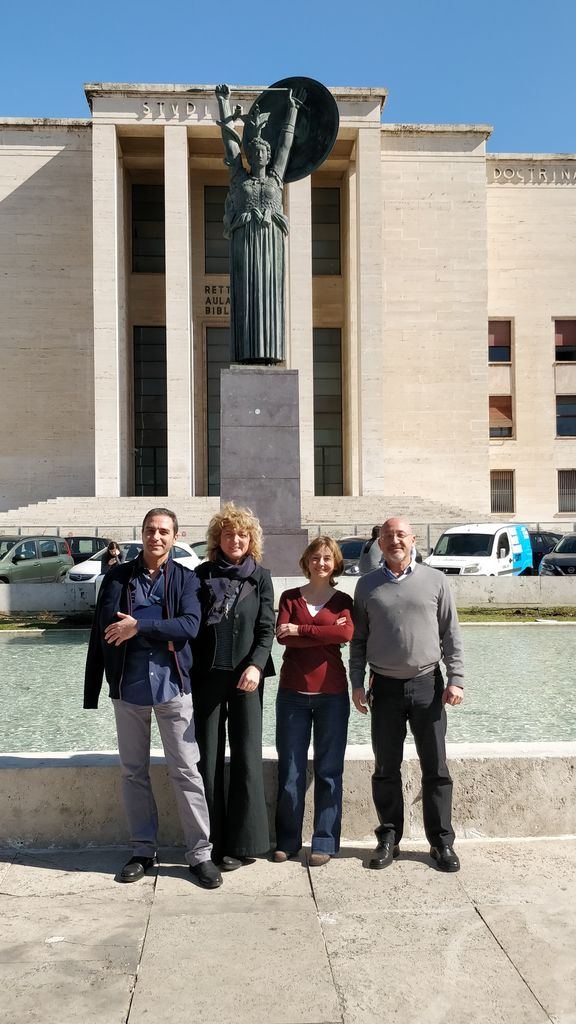
Magnetic Fields for Muscular Atrophy: New Method Slows Down Muscle Decline and Improves Functionality
Amyotrophic Lateral Sclerosis (ALS) is a severely disabling neurodegenerative disease that affects nerve cells responsible for muscle control, compromising the movements of voluntary muscles. The main target of previous studies were the motor neurons, whose degeneration leads to muscle atrophy.
A new study published on Scientific Reports (Nature Publishing Group), is the result of the collaboration of an interdisciplinary team of Sapienza, composed of four different Departments (related to the fields of basic molecular biology, anatomic pathology, physiology, clinic) and has used a translational approach with different methods, employing for the first time very intense magnetic fields for muscle stimulation, with the aim of improving muscle function and slowing down its decline.
"The advantage of this methodology," explains Maurizio Inghilleri, of the Department of Human Neurosciences, "is the possibility offered by the magnetic field to reach deep muscles without making the patient feel the classic "shock" of the electrical stimulus. Our study supports the recent theory that muscles can be therapeutic targets because they participate in the progression of the disease."
The study began in 2016 on 22 patients: one arm was treated with an apparatus that delivered magnetic fields of twice the intensity of the Earth's magnetic field with pulses lasting a few millionths of a second, while the contralateral arm was treated with a placebo stimulation in a "blind" experiment. Clinically, an increase in muscle strength on the really stimulated side was observed.
Subsequently, a non-invasive needle biopsy of the muscle tissue was performed. The extracted material was examined from three points of view: at the physiological level Eleonora Palma, of the Department of Physiology and Pharmacology, studied the aceltylcholine response of nicotinic muscle receptors, identifying a more efficient response following magnetic stimulation, with a progressive improvement of function; Carla Giordano, of the Department of Radiology, Oncology and Pathology, has deepened the myopathologic features, finding differences in shape and size in the stimulated muscle fibres compared to those not stimulated; Antonio Musarò, of the Department of Anatomy, Hystology; Forensic Medicine and Orthopedic, analysed the muscle at the molecular level, identifying a series of genes that favour the recovery from muscular atrophy.
The results of this research open new perspectives to combat muscular atrophy and can be applied to all the pathologies in which is needed muscular rehabilitation that can act on the deep muscles.
References:
Neuromuscular magnetic stimulation counteracts muscle decline in ALS patients: results of a randomized, double-blind, controlled study - Musarò, A., Dobrowolny, G., Cambieri, C., Onesti, E., Ceccanti, M., Frasca, V., Pisano, A., Cerbelli, B., Lepore, E., Ruffolo, G., Cifelli, P., Roseti, C., Giordano, C., Gori, M. C., Palma, E., & Inghilleri, M. - Scientific Reports 2019, 9, 2837. DOI: https://doi.org/10.1038/s41598-019-39313-z
Further Information
Eleonora Palma
Department of Physiology and Pharmacology, Sapienza University of Rome
eleonora.palma@uniroma1.it
Maurizio Inghilleri
Department of Human Neurosciences, Sapienza University of Rome
maurizio.inghilleri@uniroma1.it
Antonio Musarò
Department of anatomical medical histological and legal sciences of the locomotor system, Sapienza University of Rome
antonio.musaro@uniroma1.it
Carla Giordano
Department of Radiologic, Oncological and Anatomo-Pathological Sciences, Sapienza University of Rome
carla.giordano@uniroma1.it



